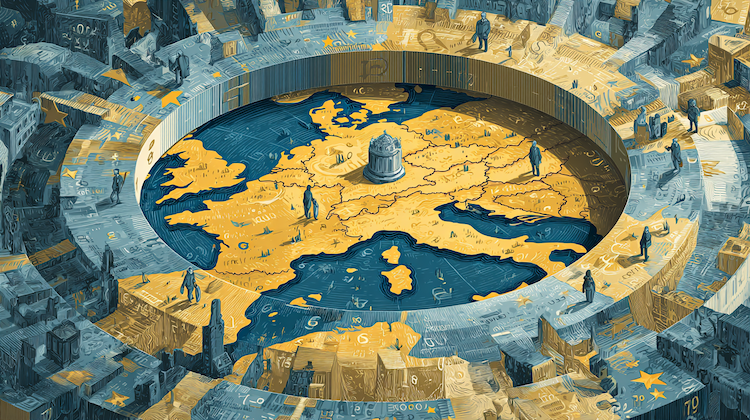Welcome to DU!
The truly grassroots left-of-center political community where regular people, not algorithms, drive the discussions and set the standards.
Join the community:
Create a free account
Support DU (and get rid of ads!):
Become a Star Member
Latest Breaking News
Editorials & Other Articles
General Discussion
The DU Lounge
All Forums
Issue Forums
Culture Forums
Alliance Forums
Region Forums
Support Forums
Help & Search
General Discussion
Related: Editorials & Other Articles, Issue Forums, Alliance Forums, Region ForumsEurope's Bid for Autonomy: The Euro's Evolving Global Role

President Christine Lagarde’s recent proposal signals a pivotal shift, aiming to elevate the euro’s international standing and bolster European foreign policy independence.
https://www.socialeurope.eu/europes-bid-for-autonomy-the-euros-evolving-global-role

The shifting landscape of international politics, significantly influenced by the policies of President Donald Trump, is compelling the European Union to forge a more assertive international policy. This represents a departure from the comfortable protection afforded by US foreign policy since the conclusion of the Second World War. An initial stride in this direction was the “ReArmEU” programme, now known as “Readiness 2030”, which extends financial aid to member states to augment their armaments expenditure. While the establishment of a comprehensive European defence force was a logical progression, the European Commission, adopting a cautious approach reminiscent of the monetary union’s genesis, stopped short of formally proposing it. Just as the European Monetary System (EMS) – a coordination of national currencies – preceded the approval of the Economic and Monetary Union (EMU) in Maastricht, the current strategy appears to favour incremental steps.
Now, Christine Lagarde, President of the European Central Bank (ECB), has advocated for “a greater international role” for the euro, specifically its active function as an international reserve currency. This proposal, made at a recent conference in Berlin, is seen as crucial for fostering greater autonomy in European foreign policy. President Lagarde presented several compelling arguments to justify this new orientation for European monetary policy. The euro currently stands as the world’s second-largest international reserve currency, holding a 20 percent share of global reserves, in contrast to the US dollar’s 58 percent. Other major currencies, such as the Chinese Renminbi, the Japanese yen, and the British pound, possess significantly smaller shares. A further argument in the euro’s favour is the European Union’s extensive trade relationships, encompassing 72 countries and accounting for 40 percent of global trade – more than double its currency reserves.
Lagarde also contextualised her proposal by outlining the historical evolution of the international monetary order. She recounted the nineteenth century’s Gold Standard era, which was centred on the pound sterling and lacked institutional coordination. This monetary order collapsed with the onset of the First World War, as belligerent nations adopted protectionist policies. The post-war period saw its rebuilding, with the US emerging as the dominant economy. Following the severe economic crisis of 1929, President Roosevelt declared the dollar inconvertible into gold in 1933. The Bretton Woods Agreement in 1944 subsequently established a fixed parity between the dollar and gold, setting it at $35 per ounce (a stark contrast to today’s value of over $3,500). In 1971, President Nixon again declared the dollar inconvertible into gold, ushering in the era of floating exchange rates.
The nation that secures the monopoly of the international currency gains substantial advantages, famously dubbed “exorbitant privilege” by Valéry Giscard d’Estaing, then France’s Minister of Finance under General de Gaulle. While countries with non-dominant currencies are compelled to restrict imports when foreign currency reserves dwindle, the same constraint does not apply to the nation holding the reserve currency. Moreover, in times of international financial crisis, capital tends to flow into the strongest and most stable economy, perceived as a safe haven. This phenomenon can lead to an inflationary process within the international monetary and financial system, a process that some economists, such as Jacques de Larosière, have denounced as dangerous and without clear limits.
snip
1 replies
 = new reply since forum marked as read
Highlight:
NoneDon't highlight anything
5 newestHighlight 5 most recent replies
= new reply since forum marked as read
Highlight:
NoneDon't highlight anything
5 newestHighlight 5 most recent replies
Europe's Bid for Autonomy: The Euro's Evolving Global Role (Original Post)
Celerity
Thursday
OP
WSHazel
(452 posts)1. Europe is poised for an economic and political renaissance
Capital is already flowing to Europe, and a lot of the industries that create America's exceptionally high standard of living, such as tech and financial services, can just as easily be done on the other side of the Atlantic. Money follows the innovation, and a lot of researchers are heading to Europe because of the American hostility to immigrants. The best want to work with the best, and if America is not safe for foreigners, then those foreigners can go somewhere else, and take the top Americans with them.